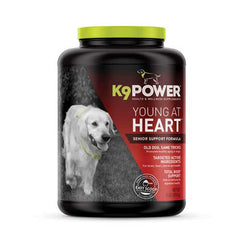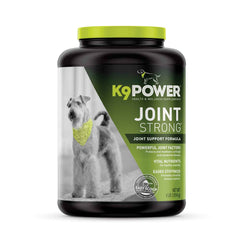4 Tips To Keep Your Aging Dog Healthy & Happy
It’s not something we want to admit. Our dog may be getting older.
But, what does this really mean? Another candle atop their doggie birthday cake isn’t cause for concern. Many dogs live long, healthy lives. We at K9 Power, want that for your dog. We know that, with some action and special care, your dog’s older years can be incredible ones.
What’s Considered a Senior Dog
Is seven the lucky number!?
According to the American Medical Veterinary Association (AMVA), when a dog reaches the age of seven they are considered senior, although this may change depending on their breed. Typically, larger dogs age faster than smaller breeds. For some added context, the chart below shows the age of a dog and how it translates into human years.

Of course, the moment when the clock strikes seven years old for your dog isn’t cause for stress or alarm. However, it is a great reminder to begin considering how to take extra care of your dog. Often, we tend to delay this until an inciting incident occurs, meaning a sudden change for the worse. If we wait until then to act, we could be trying to counteract years of less than healthy habits.
We want to avoid this. We find that it’s important to establish healthy habits earlier, that way your dog is set up for healthier golden years.
Before we dive into ways to establish healthy habits, here are four common health problems seen most in aging dogs.
4 Common Health Problems in Senior Dogs
1. Hearing & Vision Loss
Just because our dogs can’t voice a hearing or vision loss problem, there are other ways they do tell you. Keep note if your dog isn’t responding to your calls or reacting to loud noises. This could be an early signal of hearing loss. If your dog pauses at the stairs or when going outside at night, this could be a sign of vision loss. If you see any of these symptoms, it’s time to head to your vet for a checkup (and make sure to voice your concerns!).
2. Heart Problems
When we think of dogs, we naturally think of their full heartedness. No one wants to think about an unhealthy heart. But heart disease is unfortunately a very common issue with older dogs. This happens when their heart cannot pump blood efficiently, and fluid begins to build up in the heart, lungs and chest cavity. If you notice your dog coughing, having difficulty breathing, loss of interest in exercise, loss of consciousness and sudden vomiting, it’s time for a visit to the vet.
3. Weight Gain and Obesity
Oh boy! We know that for a lot of older dogs (and their humans), this can be a sensitive issue. Many factors can contribute to increased weight, like lack of exercise and a reduction in the total amount of food needed every day. As our dogs age, it’s important to take extra notice of their weight. Extra weight can lead to additional problems, from putting extra strain on their heart and lungs, to our next common ailment, joint point.
4. Joint Pain
One of the most prevalent issues we see in older dogs is joint pain, especially larger breeds. If you notice your dog laying around more, not playing as much, or showing an overall stiffness in their strut, they likely are dealing with joint pain from osteoarthritis. This is the most common cause for joint pain and is seen in about one out of three older dogs. Currently, there is no “cure” for this progressive condition, but you can help ease their pain. And if you take action in their junior years, you can at least help delay the onset of osteoarthritis.
Help prevent and ease the symptoms of these four common issues seen in senior dogs with these four easy tips.
4 Ways to Help and to Prevent Side Effects to Aging
1. Keep your dog active.
An active dog is a healthy one! It’s a sign that they feel great and aren’t dealing with some sort of painful issue. However, as a dog’s age changes, so should our definition of being truly “active.” For most, this means that they won’t be running around for hours like they did for years. That’s completely fine. The best thing to do is simply keep them moving. It doesn’t have to be strenuous activity. Keep up with your regular walks and make play time a fun priority to ensure your dog stays young at heart.
2. Elevate food and water dishes.
This simple change at the food dish can help keep them more engaged and active when they eat. It requires them to stand up (unless perhaps you have a Great Dane!), and it discourages lazy eating habits. However, there comes a time when this might even be too much for your dog. If you notice your dog isn’t eating because it’s too hard to get to their food dish, we do suggest you keep it on the floor, and to speak to your veterinarian to make sure nothing else more serious is going on.
3. Add a supplement to their diet.
Of course we feel very strongly about this tip. It’s why we love doing what we do for over 20 years. By adding a supplement to your dog’s diet, you help ensure they’re getting a full balance of the essential nutrients they need. Furthermore, you’ll know they are delivered in the proper amount and efficiently.
We have two supplements we recommend most to older dogs:
In your dog’s senior years, systems in their body become less efficient. Keep your dog’s systems functioning properly with a powerful blend of antioxidants, vitamins, amino acids, and probiotics to help promote joint, vision, heart, digestion, and immune health.
Age is just a number.
Ease stiffness and increase mobility with powerful joint factors that help promote and maintain cartilage and connective tissue. Hyaluronic acid helps provide joint lubrication, while antioxidants help boost immune response and reduce inflammation.
Keep your pup comfortable throughout the day.
4. Lastly, continue to give your dog joy and lots of love.
Love never hurt any dog. Even if our dogs aren’t the chipper bodies they used to be, they still may be chipper souls. Going to the places they love and letting them see and smell their favorite places is a great way to boost their spirits and continue to show them love. At home, make sure they can rest comfortably in cozy beds. And of course, keep up with all the pets and kisses.
Love is always a great and powerful medicine.

No matter your dog's age, there's always a bit of extra help you can provide.
Have a question for us?
Don’t hesitate to reach out with any questions about what supplement would be best for your dogs to start incorporating into their food regimen. Send us an email at support@k9power.com and we’ll share our best recommendations and advice.









Leave a comment